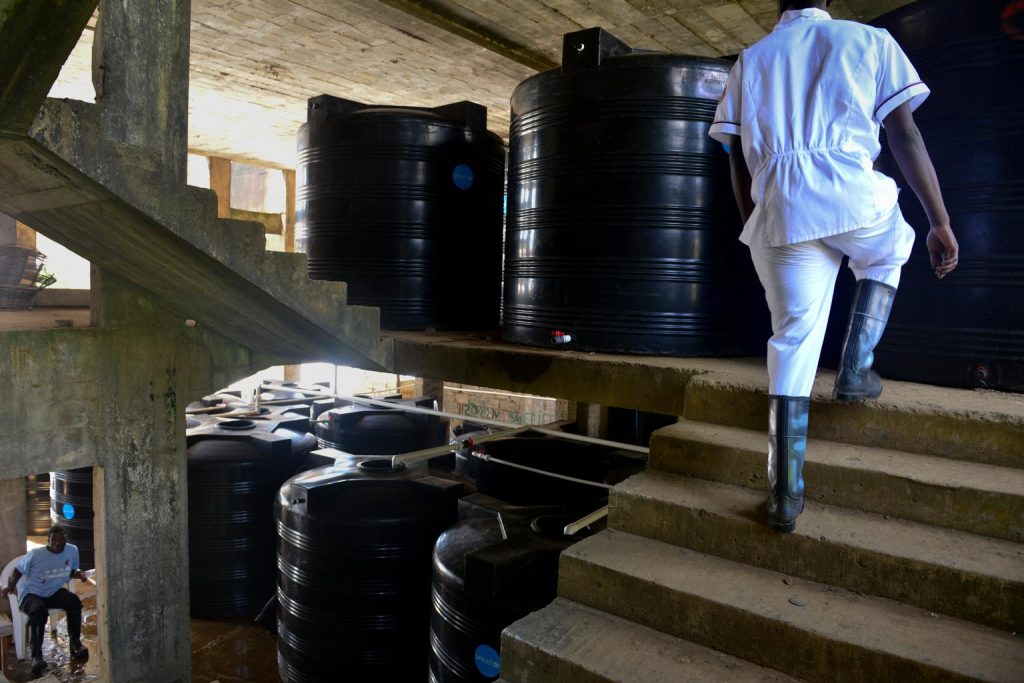Guillaume Lachenal traces the urgent past of the current ebola outbreak, offering some surprising lessons about borders.
Evidence Reviews
Outbreak of Unknown Origin in the Tripoint Zone
Regions
West and Central Africa
UNICEF/UNI174687/Nesbitt
On 13 November 2014, Manykye S. Jackson climbs stairs past UNICEF-provided water storage vats, at the UNICEF-supported WATSAN (water and sanitation) chlorine mixing station at the Ministry of Defence compound in the Congotown neighbourhood in Monrovia, the capital. Another worker on a lower level is seated near several of the vats. The mixing station provides chlorination services for a newly built Ebola treatment unit (ETU) nearby. UNICEF is supplying water to meet the drinking, washing, bathing and disinfecting needs for patients at the health facility, which has two chlorine disinfecting stations. At least 150 litres of water is required to fully care for each Ebola patient 10 times the amount that a Liberian normally uses. The ETU is one of two built in October 2014 by UNICEF, the World Health Organization (WHO) and the Liberian Government, to help treat the overflow of Ebola patients at other health facilities. The units each have a 100-bed capacity.
In November 2014, Liberia remains one of three countries in West Africa experiencing widespread and intense transmission of Ebola virus disease (EVD). UNICEF continues to support social mobilization efforts to raise awareness of the disease, its symptoms and how to prevent its spread all of which are critical to curtailing the unprecedented outbreak. UNICEF remains at the forefront of efforts to respond to and help curtail the outbreak. Since the beginning of the outbreak, UNICEF has brought in 967 metric tons of emergency aid, including essential protective gear, tents, diarrhoeal kits, emergency health kits, and sanitation supplies such as chlorine. UNICEF is also procuring water, sanitation and hygiene supplies and supporting chlorine mixing stations at new Ebola treatment units in Monrovia, the capital, and is distributing hygiene kits for households, as part of efforts to promote hand-washing as a key behaviour for preventing Ebola transmission.
Related content
Briefing
Key Considerations: Child Engagement in the Context of Disease Outbreaks in Eastern and Southern Africa
Effective child engagement strategies are essential to optimise the response to disease outbreaks and minimise their impact while ensuring children’s protection, well-being and resilience. When children understand disease outbreaks, they are better able to cope, contribute and recover. This promotes…
Central and East Africa Hub
SSHAP
2024
Briefing
Key Considerations for Responding to Floods in South Sudan Through the Humanitarian-Peace-Development Nexus
In common with many other African countries, the Republic of South Sudan is increasingly experiencing devastating floods linked to climate change.1,2 The Indian Ocean Dipole (IOD) and El Niño regulate the climate of Equatorial Eastern Africa. In 2019, a dipole…
Central and East Africa Hub
SSHAP
2024
Report
Conflict-Sensitive Returns and Integration in South Sudan
Since fighting flared up in Sudan in April 2023, an estimated 8.2 million Sudanese have been forcibly displaced, out of which 1.7 million are hosted by neighbouring countries, including 588,711 people by South Sudan.1 At the same time, an estimated…
Central and East Africa Hub
2024
Briefing
Key Considerations: Social, Structural and Community Dynamics of Cholera Transmission and Mortality in Ethiopia
The current cholera outbreak in the Federal Democratic Republic of Ethiopia began in August 2022. As of April 2024, active outbreaks had been recorded in most regions of the country, including: Amhara; Dire Dawa; Harari; Oromia; Southern Nations, Nationalities and…
Central and East Africa Hub
SSHAP
2024


